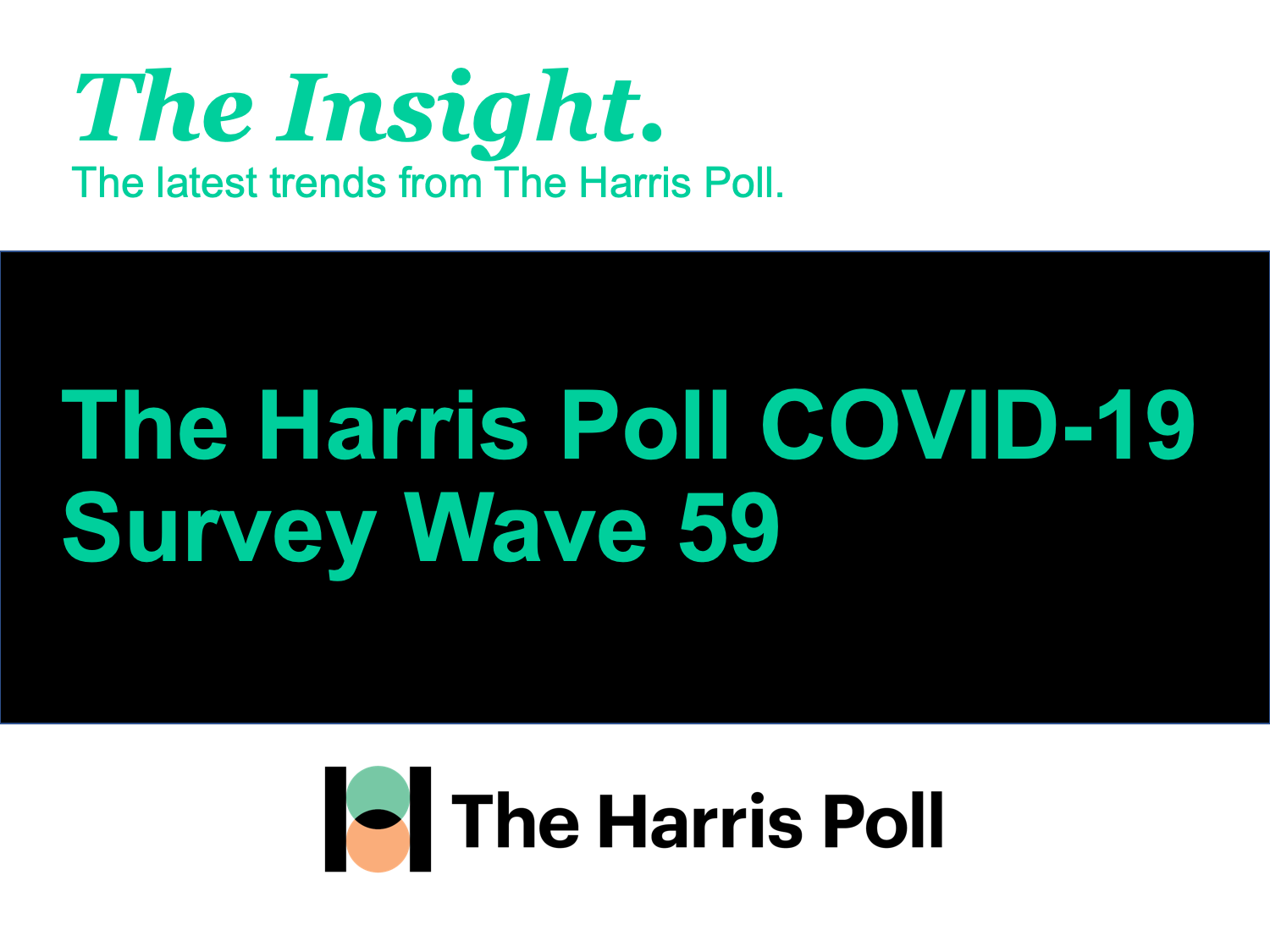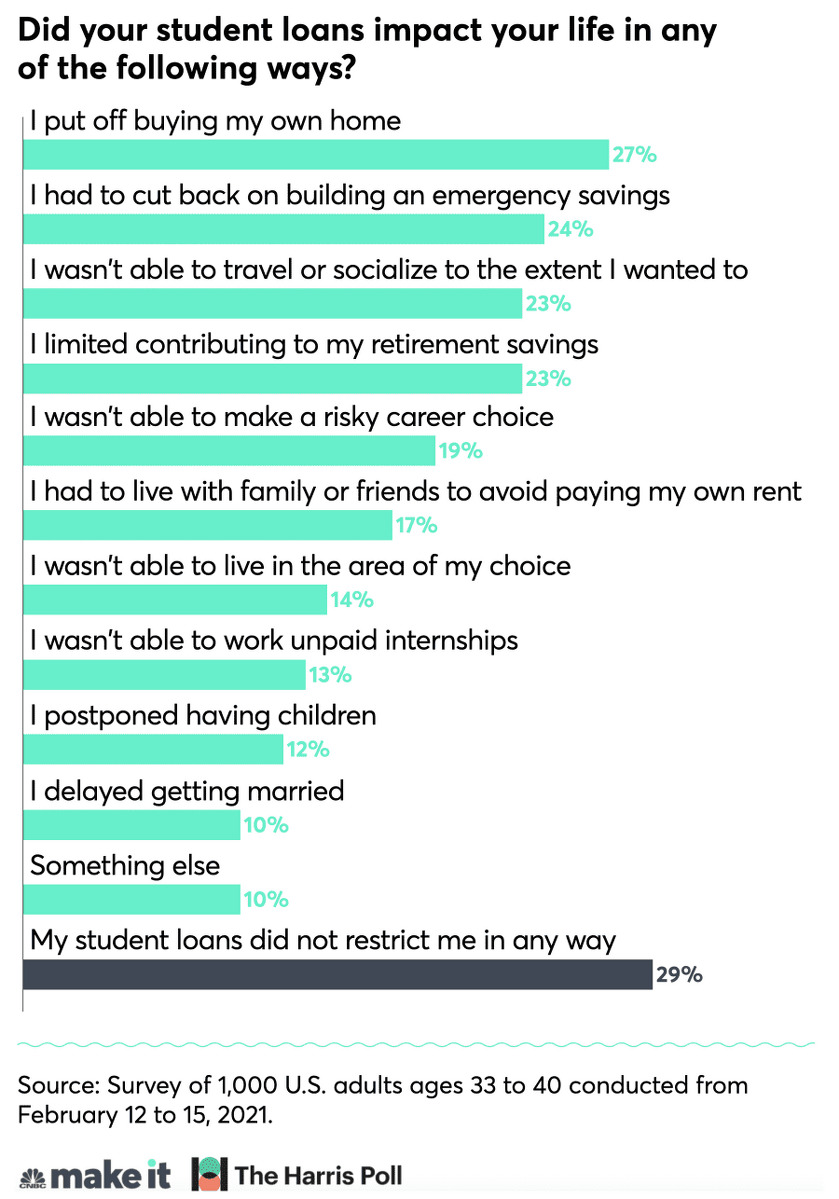Brief • 4 min Read

In The Harris Poll COVID-19 Tracker (Week 59) fielded April 9th to 11th, 2021 among 1,963 U.S. adults, we look at how Americans feel about businesses requiring proof of vaccination, how to reach Gen Z’s vaccine hesitancy, how Older Millennials are being held back by student loans, how consumers feel about the “Voltswagen” prank, and how the pandemic is changing our grocery shopping habits.
As a public service, our team has curated key insights to help leaders navigate COVID-19. Full survey results, tables, and weekly summaries can be accessed for free at The Harris Poll COVID-19 Portal. We will continue to actively field on a regular cadence to track the shifts in sentiment and behaviors as the news and guidelines evolve.
Can Businesses Require Proof of Vaccination? Experts Say Yes: CBS-Harris Poll
As companies rush to develop so-called “vaccine passports” and as access to COVID-19 vaccines expands, the debate about whether businesses can require proof of vaccination from employees and patrons is heating up. We teamed up with CBS to gauge Americans’ perception of vaccine passports, and here’s what we found:
- Awareness is on the rise: When first asked about vaccine passports in early March only (39%) reported some level of awareness. Now, just over a month later, that metric has grown to (59%).
- But there is still confusion when it comes to what qualifies as valid or sufficient proof of vaccination for your passport. (51%) correctly assumed that you need proof of vaccination meaning it’s been two weeks since your last dose but (51%) also said that just proving you’ve had your final dose was sufficient.
- Americans support vaccine passports overall: More than half support the need to show proof of vaccination for flying on a plane (68%) and even going to work (57%) but only (46%) think it’s necessary to enter a store.
- However, privacy concerns still exist: Even with the rise in support of vaccine passports, we cannot forget that we live in the digital age and privacy concerns are top of mind for many. Three in five (60%) report that they are concerned of the potential threat for patient privacy violation since digital apps will need to access a person’s health record.
Takeaway: There tensions stirring regarding proof of vaccination and there are nuances in consumer support for vaccine passports across activities, meaning adoption won’t be universal across categories, companies must listen and cater to consumer safety preferences and privacy concerns when it comes to re-opening.
In the COVID-19 Vaccine Push, No One Is Speaking Gen Z’s Language: STAT-Harris Poll
Useful COVID-19 information isn’t reaching the Instagram generation and the lack of information is clearly having an impact. And even the limited efforts to reach them where they are — like Instagram’s links to its “COVID-19 information center”— aren’t working. Here’s what we found in our study with STAT News:
- Waiting game: (21%) of Generation Z — defined as young adults aged 18 to 24 — said they would not get vaccinated against Covid-19 and another (34%) said they would “wait awhile and see” before getting vaccinated.
- More than half of Gen Zers (57%) don’t think their peers are taking strict COVID restrictions compared to just (18%) of Boomers (age 57+).
- One fifth of younger generations, Gen Z (20%) and Millennials (21%), report that they know many people that have gone to informal gatherings with 20 or more guests – double the amount reported by Boomers (10%).
Takeaway: The latest rise in COVID cases in many areas is being fueled in part by younger Americans. Reaching and convincing this generation – many of whom may reason they are not particularly at risk for severe illness from COVID and don’t need the vaccine – will require a different approach than older Americans.
For Many Older Millennials, Student Loan Debt Delayed Buying Homes, Starting Families and Pursuing Creative Careers: CNBC-Harris Poll
This week in our partnership series with CNBC “ Middle-Aged Millennials, we look at how the impact of student loans are holding many Millennials back as they transition to adulthood. Here is what we found:
- Student loan crisis: About 45 million Americans carry some student loan debt. Among older millennials who attended at least some college, nearly 4 in 5 took on some type of debt to finance their higher education, borrowing an average of $21,880.
- An end in sight?: About (68%) of older millennials, those born between 1981 and 1988, are still working to pay off their student loans. Some are closer to payoff than others: about (11%) report having paid off nearly all of their loans while nearly (40%) have over half of their total balance still left.
- Effects of monthly student loan payments are far-reaching: Roughly a quarter of older millennials say student loans affected their ability to buy a home (27%), as well as save for emergencies and retirement (24%). Nearly one in five (17%) said they had to live with family or friends because they couldn’t afford their own rent and student loan payments.

Takeaway: Older millennials are inching their way to 40 and approaching a difficult financial time where they are faced with saving for their futures and saving for their children, with the added stress of student loan debt. The silver lining? This cohort is pioneering the path to being financially savvy and literate on their own terms.
How VW’s Polarizing ‘Voltswagen’ Prank Went Over With Everyday Consumers: Ad Age-Harris Poll
Despite a wave of negative headlines about its April Fools’ Day prank, Volkswagen is not any worse off with everyday consumers – but the automaker also did not help itself by pretending to rename itself “Voltswagen,” according to our new poll with Ad Age.
- The saga went unnoticed by a majority of consumers, which found that only (21%) of consumers had heard about the “Voltswagen” announcement by the time they were polled. Of those who heard of the news, (73%) said they were aware that it was an April Fools’ joke (perhaps because the poll was conducted after reports came out that it was a stunt).
- Six in ten (59%) of consumers who were aware of the stunt said it did not change their opinion of the brand. Just (20%) think better of Volkswagen, while (21%) said they now hold a worse opinion of the brand.
- But younger people are apparently more into the jokes: (64%) of millennials and 61% of Gen Zers say brands should partake in April Fools’ Day, but only (38%) of Gen Xers and (35%) of Boomers agree.
Takeaway: “Holiday promotions can be a powerful and effective tool for brands to engage with customers and build buzz, but not all holidays are created equally,” said Will Johnson, CEO of The Harris Poll. “April Fools’ Day is polarizing because it gets at the heart of the brand-customer relationship—trust. As our research shows, consumers are divided on April Fools’ Day marketing stunts, so brands must carefully weigh the benefits against the risks.”
Price and Safety Concerns Will Endure Post-Pandemic: Instacart-Harris Poll
Not all companies felt negative effects of the pandemic – take Instacart for example. But now that states are opening up and Americans want to get back to shopping, what will that mean for the companies that thrived during the pandemic and what does the future of shopping look like? Here’s what we found in our poll with Instacart:
- The pandemic has changed consumer behaviors: (51%) of Americans are making sure they have extra hand sanitizer, hand soap, or disinfectant wipes and (39%) said they don’t want to run out of essentials like batteries, toilet paper, and paper towels.
- Price is also top of mind for consumers, with (36%) saying that they’ve learned how to save money on groceries in the past year.
- Additional 2021 trends we identified include an emphasis on health and wellness, with (36%) of respondents saying they plan to keep focusing on eating healthier food now that they have learned new shopping habits and how to cook in the past year.
Takeaway: America will soon (hopefully) return to normal after the crisis period of the pandemic ends, and companies that saw a boom during the pandemic will need to translate the lessons of the past year into long-term value for consumers. Many innovations that became integral to life amid COVID, such as online grocery delivery, will stick around as consumers prioritize convenience and digitalization.
Subscribe for more Insights
Subscribe to our newsletter for the latest trends in business, politics, culture, and more.
Download the Data
This survey was conducted online within the U.S. by The Harris Poll from April 9 to 11, among a nationally representative sample of 1,963 U.S. adults.
Download
Subscribe for more Insights
Subscribe to our newsletter for the latest trends in business, politics, culture, and more.
Download the Data
This survey was conducted online within the U.S. by The Harris Poll from April 9 to 11, among a nationally representative sample of 1,963 U.S. adults.
DownloadRelated Content








